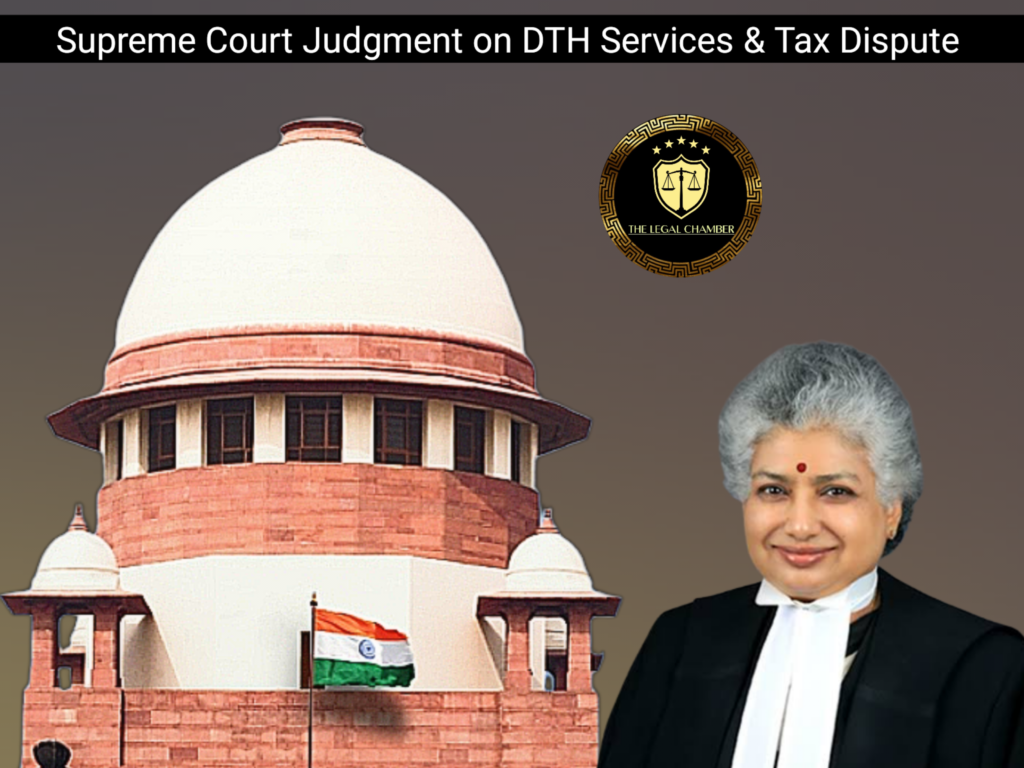
The Supreme Court ruled that states have the legislative competence to levy entertainment tax on DTH services under Entry 62, List II (State List) of the Constitution, as the tax is on the “entertainment” aspect, not the broadcasting service. The Court upheld the “aspect doctrine”, allowing simultaneous taxation by states (on entertainment) and the Centre (on broadcasting services under Entry 97, List I), provided the levies target distinct aspects of the same transaction. It rejected arguments of legislative overlap, emphasizing the pith and substance of state laws as valid exercises of taxing power.
Facts Of The Case:
The case involved multiple civil appeals and writ petitions challenging the constitutional validity of state laws imposing entertainment tax on Direct-to-Home (DTH) broadcasting services. The appellants, including major DTH operators like Tata Sky, Dish TV, and Bharti Telemedia, argued that their services fell exclusively under Entry 31 (broadcasting) and Entry 97 (service tax) of the Union List, making state taxation impermissible. States like Kerala, Uttar Pradesh, Rajasthan, and others defended their laws, asserting that Entry 62 of the State List (taxes on entertainments) allowed them to tax the entertainment aspect of DTH services. The dispute arose when states amended their entertainment tax laws to include DTH services, while the Centre simultaneously imposed service tax under the Finance Act, 1994. High Courts had delivered conflicting judgments, with some upholding state laws and others striking them down. The Supreme Court consolidated these cases to resolve whether state legislatures had the competence to tax DTH services or if the field was entirely occupied by Parliament. The Court examined the interplay between Union and State taxing powers, the scope of “entertainment” under the Constitution, and whether dual taxation violated constitutional principles. The verdict clarified whether states could levy entertainment tax on DTH services without encroaching on Parliament’s exclusive domain over broadcasting and telecommunications.
Procedural History:
The case originated when multiple DTH operators, including Tata Sky, Dish TV, and Bharti Telemedia, challenged the constitutional validity of state entertainment tax laws before various High Courts. Several High Courts, including those of Kerala, Delhi, Punjab, and Uttarakhand, upheld the state laws, ruling that DTH services fell within the ambit of Entry 62 (taxes on entertainments) of the State List. However, the Madras High Court partially struck down Tamil Nadu’s law, holding that the charging provision was defective. Aggrieved by these rulings, the DTH operators filed appeals before the Supreme Court, while the State of Kerala also appealed against the Kerala High Court’s decision that struck down a discriminatory provision in its law. The Supreme Court consolidated all cases to resolve the constitutional question of whether states could levy entertainment tax on DTH services without encroaching on Parliament’s exclusive power over broadcasting under Entry 31 (List I) and service tax under Entry 97 (List I). After extensive hearings, the Court delivered its judgment, clarifying the legislative competence of states in taxing DTH services while balancing it with central taxation powers.
READ ALSO :Justice Delayed, Not Denied: Supreme Court Orders Immediate Release of Compensation Certificates
Court Observation:
In its judgment, the Supreme Court made several key observations while upholding the constitutional validity of state laws imposing entertainment tax on DTH services. The Court emphasized that Entry 62 of List II (State List) grants legislatures the power to tax “entertainments,” which includes the content delivered through DTH platforms, distinct from the technical broadcasting service itself. It applied the “aspect doctrine,” ruling that while Parliament regulates broadcasting under Entry 31 (List I) and imposes service tax under Entry 97 (List I), states can simultaneously tax the entertainment component under their exclusive domain.
The Court rejected arguments of legislative overlap, clarifying that the pith and substance of state laws targeted entertainment, not broadcasting infrastructure. It noted that dual taxation (central service tax and state entertainment tax) was permissible since they operate on different aspects of the same transaction. The judgment also affirmed that the definition of “entertainment” in state laws could evolve with technology, covering DTH services without exceeding constitutional limits. However, it cautioned against double taxation of the same taxable event, stressing that the levies must remain distinct in purpose and incidence. The ruling balanced federalism by preserving both Parliament’s authority over telecommunications and states’ fiscal autonomy in taxing entertainment.
Final Decision & Judgement:
In its final judgment, the Supreme Court upheld the constitutional validity of state laws imposing entertainment tax on DTH services, ruling that such levies fall within the legislative competence of states under Entry 62, List II (taxes on entertainments) of the Seventh Schedule. The Court clarified that while Parliament retains exclusive authority over broadcasting and service tax under Entries 31 and 97 of List I, states are empowered to tax the entertainment aspect of DTH transmissions as a distinct taxable event. Applying the “aspect doctrine,” the Court held that dual taxation (central service tax and state entertainment tax) is permissible since they target different facets of the same service—technical transmission versus content consumption. The judgment dismissed challenges to state laws, including those of Kerala, Uttar Pradesh, and Rajasthan, but emphasized that taxation must not overlap in a way that amounts to double jeopardy. The Court also struck down discriminatory provisions, such as Kerala’s exemption threshold for small cable operators, while affirming the broader principle that states can modernize tax regimes to cover evolving entertainment mediums like DTH. The verdict reinforced fiscal federalism, ensuring neither level of government encroaches on the other’s constitutional domain.
Case Details:
Case Title : State of Kerala & Anr. vs. Asianet Satellite Communications Ltd. & Ors Citation: 2025 INSC 757 Civil Appeal Nos.: 9301 of 2013 Date of Judgment: May 22 ,2025 Bench/Justices: Justice Nagarathna
Download The Judgement Here